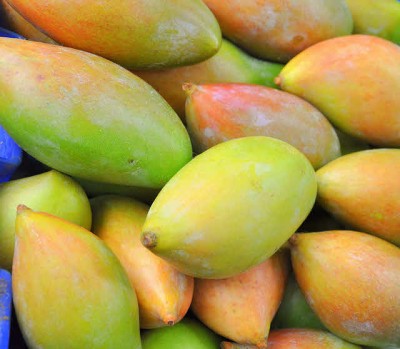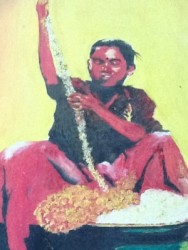by Ram Govardhan
I was trembling and Sandra was dazed when Ismail Bhai caught us in the mango orchard on the outskirts of our village. I was eleven, she ten, and both of us measured four-seven. But I looked a little taller given my skinny build contrasting her chubby one. Ismail Bhai was the only caretaker of the sprawling grove. He was too tall and towered over the dwarfish small-breed trees. He lived alone, never spoke to anyone and never stepped out of the orchard. Although he was old enough to be a grandfather, or even a great-grandfather, he was always known as Ismail Bhai.
“I am six-three even at sixty three,” said Ismail Bhai. “So I must have been taller in the prime of my life.” We did not understand what prime of life was, nor did we ask him because we were in dread of the looming punishment.
We were never caught because we always entered and escaped through the porous northern end, while Ismail Bhai watched over the reinforced southern gate. Yet, most thieves preferred the southern one because making their escape into the village across the road was easier. But Ismail Bhai had his own ways of catching them and the punishments he meted out had gained such notoriety that there was hardly anyone to take him on. However, taking advantage of his mid-afternoon slumber, a few foolhardy youngsters ripped off mangoes, but the occasional bashings they had to endure deterred a hundred others. Thus the number of attempts invariably decreased by the season, but Ismail Bhai’s ailments multiplied by the year.
Unlike the four previous summers, spread over several of our sorties when we could walk away with bagfuls unscathed, this time, Ismail Bhai caught us red-handed with a dozen plump mangoes stuffed in each of our haversacks.
As we and our backpacks shivered, Ismail Bhai sat us down with a wave of his hand and asked our names. We looked at each other before answering, as if we needed each other’s consent to reveal our names.
“Raju,” I said.
“Sandra.”
“Ismail,” he said and extended his hand, I clasped his big hand instinctively. That was my first handshake in a sitting manner.
Even if he was in his regimentals, his unshaven, rugged looks eased us a bit for such unkempt indiscipline was incapable of exacting severe costs of our wrongdoing. And then his disarming smile instantly relaxed us.
Appreciating our wan smiles, he asked us to put our backpacks aside. He then asked us to pluck half a dozen mellow mangoes he pointed to. We followed him to his thatched shack that was a kilometre away, at the other end of the orchard. Our heads could only reach up to his waist. He was sauntering but his paces were so big that he was always ahead of us even as we ran, puffing and blowing.
It was a dirty, stuffy hut, things strewn all over, and there was not an inch to sit. But he insisted that we sit even as we began removing utensils, tumblers, plates, leftovers, transistor, tubes of toothpaste etc. It was too small for him, he told us, and he never stretched his legs fully while sleeping. He preferred sleeping outside the hut and curled up inside when it rained. We couldn’t see anything that can be called a bed, rolled or unrolled.
“I don’t even use a pillow, forget bed,” he said.
He asked us to wash the mangoes clean under a tap that was in the far corner of a bamboo-fenced forecourt. Next to the tap, there was a square, roofless plastic-sheet enclosure that we agreed must be his bathroom.
As we entered, we saw him dusting an electric juicer that must have been lying unused for, Sandra guessed, at least ten years. “Otherwise, it cannot accumulate so much of dust,” she whispered. I agreed.
Ismail Bhai cut the ripe mangoes into pieces and put all of them into a jar. And he asked us to pick one raw one. He cut it too and put the pieces in the jar and said, “The secret of great tasting mango juice lies in adding an unripe one to half a dozen ripe ones…for a heavenly taste.”
As we enjoyed the juice, the village butcher delivered mutton in a black polythene bag and left without saying a word. I am not sure what it was – but Ismail Bhai seemed to sense my discomfort. “Are you a vegetarian?” he asked. I nodded. He instantly kept the bag aside, and brought down a wooden casket from attic that had potatoes.
“We will make Aloo Biryani,” he said with a smile that exposed his green-yellow teeth. As he was washing the potatoes, a woman in burqa entered the hut. She began loudly cursing Ismail Bhai.
“Get out from here,” said Ismail Bhai.
“We will not be peaceful until you come home,” she said.
“Take my body home when am dead…now get out from here,” he said.
She threw the potatoes and the spice-casket out of the hut.
Angered with her behaviour, Ismail Bhai, catching her by hair, shoved her out and threw the mutton bag onto her. Picking up the bag, the potatoes and the spice-casket, she went away crying and cursing him out loud.
“This is my daily routine, don’t be frightened…let us make Aloo Biryani,” said Ismail Bhai and brought down two more caskets with potatoes and spices from the attic.
Despite the dirty surroundings, he kept vegetables and ingredients clean and safe in the caskets which, when opened, had several chequered chests.
Contrary to what we knew about him, he was sweet to us. After lunch, he stuffed a few more mangoes into out backpacks before seeing us off by saying, “Keep in touch.”
At that age, we did not understand what he meant by saying keep in touch. For over three days, we argued that it may actually mean that we must be in touch with truth and should not steal.
When we walked into the village, many were shocked to see us with bagfuls of mangoes. Seldom had anyone, they said, ever emerged out of the main gate unscathed with stolen mangoes. Every villager had several anecdotes to narrate, many of them, gained by first-hand experience.
From then on, we visited Ismail Bhai every summer and, over the years, we could see him growing fond of us. He would treat us with sweets, force us to have lunch with him, each time preparing a different sort of Aloo Biryani, and gift us sackful of mangoes. And we could see his moistened eyes while bidding goodbye.
One day, just before lunch, he asked us whether we knew swimming. He insisted that both of us learn swimming. There were four wells in the orchard and he took us to the largest one. It was full and we couldn’t see the masonry lining the circular well as the water touched the stone border. Ismail Bhai sat on the stone rim, held us by his long hands and, over two weeks, we became consummate swimmers.
As we grew into our teens, we could see him growing dumb and, to some extent, deaf too. And, within a few years, we saw his condition deteriorating. He would gesture to ask whether we had passed our exams, whether we got good grades, and whether were are happy. We wondered as to why he always asked about our happiness since, those days, we were always happy.
By the time we finished our college and realised that we loved each other, we saw Ismail Bhai was confined to bed, an elderly hakeem by his side. And then whenever we visited his hut he was too unwell even to get up, even to talk to us. The hakeem told us that Ismail Bhai was not just a caretaker but the owner of the whole orchard.
A few years later, by when we were married to each other, we went to the orchard to take his blessings. We found Ismail Bhai’s wife, Wahida, the woman we had seen fighting with him all those years ago, cooking under a mango tree. She bluntly told us that Ismail Bhai had passed away a few months earlier. She rudely waved us away ordering us not to ask any more questions.
During the six days we spent in the village we heard much gossip, but in the end, the hakeem told us that Ismail Bhai lived in the orchard for more than twenty-five years punishing himself for suspecting that his wife was unfaithful to him.
“The day he came to know that she was actually not unfaithful to him, he excommunicated himself by cutting off all contacts with the world,” he said.
When we asked as to why Ismail Bhai’s wife is in the orchard now for no fault of hers, he said, “She is punishing herself because, even though she was faithful to him all her life, she thinks she was responsible for creating grounds for him to suspect her behaviour.”
Realising that we were man and wife too, he had a word for us, “Don’t ever sow seeds of suspicion…within no time, the monster will devour your lives.”
Ram Govardhan’s first novel, Rough with the Smooth, was longlisted for the 2009 Man Asian Literary Prize, The Economist-Crossword 2011 Award and published by Leadstart Publishing, Mumbai. His short stories have appeared in several international literary journals. He lives, works in Chennai cursing the deadly humidity all the time.
Pic by https://www.flickr.com/photos/13070711@N03/






